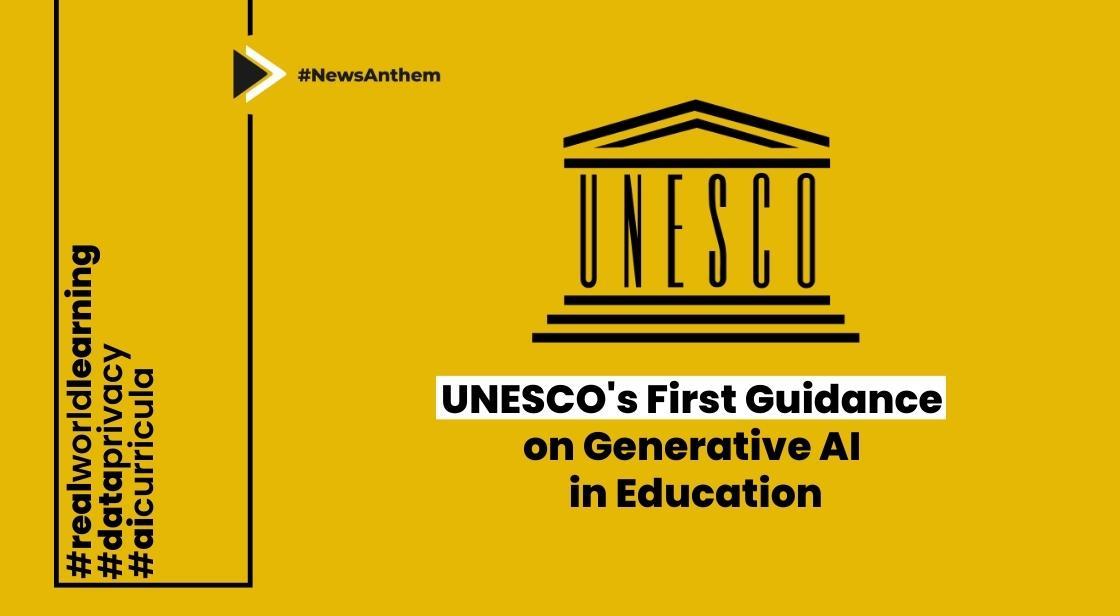UNESCO's First Guidance on Generative AI in Education Calls for Regulation

News Synopsis
UNESCO has issued its inaugural guidance on the use of Generative AI (GenAI) in education, urging governments to regulate the technology's deployment. This guidance emphasizes the importance of safeguarding data privacy and setting age limits for users.
GenAI has witnessed rapid growth since its launch, with Microsoft-backed OpenAI's ChatGPT emerging as the world's fastest-growing app. The proliferation of GenAI has prompted the development of competing technologies, such as Google's Bard.
Students have embraced GenAI for its ability to generate content, from essays to mathematical calculations, with minimal prompts.
UNESCO's Concerns
Stefania Giannini, Assistant Director-General for Education at UNESCO, expressed concerns about the educational system's ability to adapt to the rapidly evolving technological landscape.
She highlighted the challenge of aligning the transformation of education with the rapid progress and advancements in machine learning models.
In many cases, educational institutions and governments are embracing unfamiliar technology, even as leading technologists acknowledge their limited understanding of these AI models.
Key Guidelines
UNESCO's 64-page report outlines several key guidelines:
1. Government-Sanctioned AI Curricula
UNESCO stresses the need for government-sanctioned AI curricula in school education, as well as technical and vocational education and training. This move aims to ensure that students receive structured and responsible AI education.
2. Responsibility of GenAI Providers
GenAI providers are urged to assume responsibility for adhering to core values, lawful purposes, intellectual property rights, and ethical practices. Additionally, they should take measures to prevent the dissemination of disinformation and hate speech.
3. Preservation of Real-World Learning
The guidance emphasizes the importance of preserving real-world learning experiences, such as observations, empirical practices (including experiments), discussions with peers, and independent logical reasoning. GenAI should not replace these crucial aspects of education.
Global Regulatory Landscape
While China has already formulated regulations regarding GenAI, the European Union's AI Act is anticipated to be approved later this year. Many other countries are lagging behind in drafting their own AI laws.
Protecting Teachers and Researchers
UNESCO also underlines the importance of safeguarding the rights of teachers and researchers and preserving the value of their practices when utilizing GenAI in educational contexts.
Some relevant and latest facts about the use of Generative AI (GenAI) in education:
-
GenAI is a rapidly developing technology that is being used in a variety of educational settings, such as to create personalized learning experiences, generate practice problems, and grade essays.
-
The use of GenAI in education is still in its early stages, but there is growing interest in the potential benefits of this technology.
-
Some of the potential benefits of GenAI in education include:
-
Increased personalization of learning: GenAI can be used to create personalized learning experiences that are tailored to the individual needs of each student.
-
Improved engagement: GenAI can be used to create more engaging learning experiences that capture the attention of students.
-
Increased efficiency: GenAI can be used to automate tasks that are currently done by teachers, such as grading essays and generating practice problems.
-
-
However, there are also some potential risks associated with the use of GenAI in education, such as:
-
Data privacy: GenAI can collect and store large amounts of data about students, which could be used to track their behavior or target them with advertising.
-
Safety: GenAI could be used to create harmful content, such as cyberbullying or disinformation.
-
Ethical use: GenAI could be used in ways that are discriminatory or unfair.
-
Conclusion
UNESCO's guidance signifies the growing recognition of the impact of GenAI in education and the need for responsible use and regulation to ensure the best interests of learners and educators are upheld.
It is important to carefully consider the potential benefits and risks of GenAI before using it in education. Governments, educators, and technology companies all have a role to play in ensuring that GenAI is used safely and ethically in the classroom.









